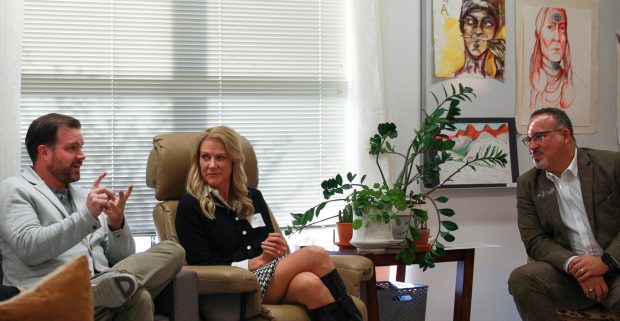U.S. Secretary of Education Miguel Cardona on Tuesday visited two Boise schools, where he announced a $6.5 million annual grant to expand community school programs in Idaho and spoke with parents about mental health.
Idaho is one of 19 states, along with Washington, D.C., that will receive Full-Service Community Schools grants from the Biden Administration. The five-year awards are going to public schools, nonprofits and other organizations that operate community school programs.
Community schools provide neighborhood services beyond education, such as family support and health care, often in partnership with nonprofits and other local resources. United Way of Treasure Valley, a nonprofit that helps fund community schools, is receiving the Idaho grant.
Cardona, a Democrat, toured Boise’s Whitney Elementary School before announcing the nationwide grants in a roundtable discussion with local education leaders, including Idaho State Superintendent of Public Instruction Debbie Critchfield and Boise School District Superintendent Coby Dennis.
“It’s really important that we understand just how valuable it is to put resources where the kids are,” Dennis said Tuesday. “I’m also equally as excited to see other communities around the state have the opportunity that we have here in Boise.”
The grant will “enhance the already strong” community school programs in Idaho, Cardona said. “The program that they have here is a model program,” he said of Whitney, a community school on the Boise Bench. “We picked this program because it’s exceptional.”
Panel touts value of community schools
Idaho has 41 community schools in 25 districts, according to the United Way of Treasure Valley, which has led an effort to expand community schools in the state. There were four – all in the Boise School District – less than a decade ago.
United Way of Treasure Valley President and CEO Tim Jackson said his group adopted a “scalable” model to connect public schools with groups that can offer resources. Those partnerships can provide school families everything from afterschool programs to food pantries to counseling.
“We’ve got a lot of community resources; how do we weave them together and support kids in our schools?” Jackson said. “Money is seeded to help to start the work, a lot of technical assistance and support is provided, and districts are able to set them up to meet the unique needs of different communities.”
Panelists said Tuesday that the community school model is particularly valuable for rural schools. Marsing School District Superintendent Norm Stewart said his district built a school resource center – called “The Hub” – after the local food bank and senior center closed.
The roughly 1,000-resident town has a high rate of low-income families, Stewart said, and the resource center provides services to families as well as students, with help from local groups.
“In a rural setting, it’s really (about) identifying the true needs of our community,” he said.
President Joe Biden’s administration since 2020 has increased funding for the U.S. Department of Education’s Full-Service Community School program five-fold, from $25 million to $150 million. The new round of grants will fund programs in 102 school districts across the country, according to the federal education department.
Critchfield, the Republican, first-term state superintendent, said she met privately with Cardona. While Critchfield said she shared frustrations with unrelated federal regulations, the Biden administration visit represented an acknowledgement of Idaho’s community school successes.
“We’ve been doing it very well, and now we’re having others take note,” she said.

Parents concerned about student relationships, teacher stress
Cardona capped his Idaho school tour with a discussion about mental health with Boise School District parents.
The district has faced a string of recent student and teacher deaths, including some related to suicide. Earlier this month, Dennis and School Board President Dave Wagers urged parents and students to draw on mental health resources, like free counseling.
A dozen Boise parents met with Cardona at Frank Church High, where they discussed school safety, parent-teacher relationships, the effects of smartphones and burnout before college, among other topics.
Some parents said that they worry about their kids’ relationships after the isolation of the COVID-19 pandemic. Others remarked that they’re concerned with the stress levels of teachers.
“Are the adults working with my children in good mental spaces? Are they feeling valued, are they feeling safe, are they feeling appreciated?” one mom said. “I want them to be in a good space so they can give their best selves to my kids.”
Cardona, a former elementary school teacher and principal with children in high school and college, praised co-curricular activities as a method to improve relationships and mental health, and urged the parents to advocate for more access to activities.
He also said the Biden administration is pushing all high schools to offer at least 12 college credits, to motivate students to continue on to college, and urging states to improve teacher pay. Cardona noted that Idaho salaries lag behind the national average.
“There are certain things that we’re doing to get to all the things that we’re talking about,” he said.
